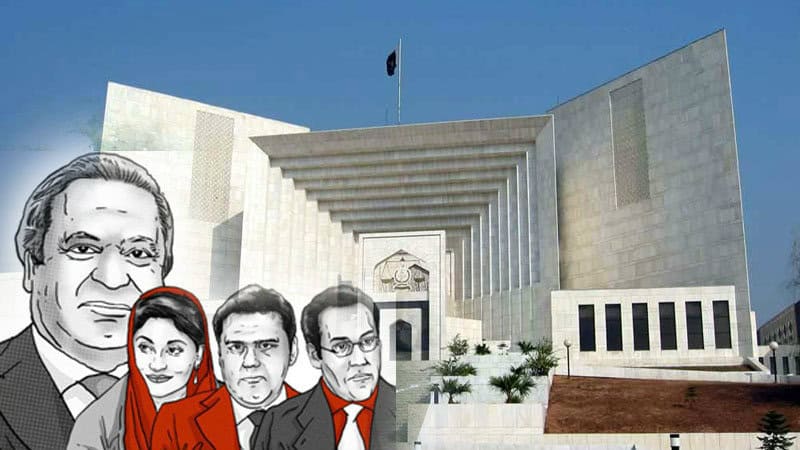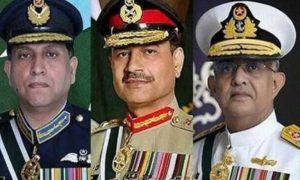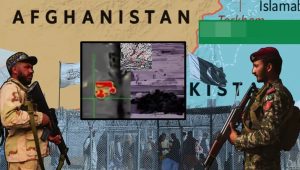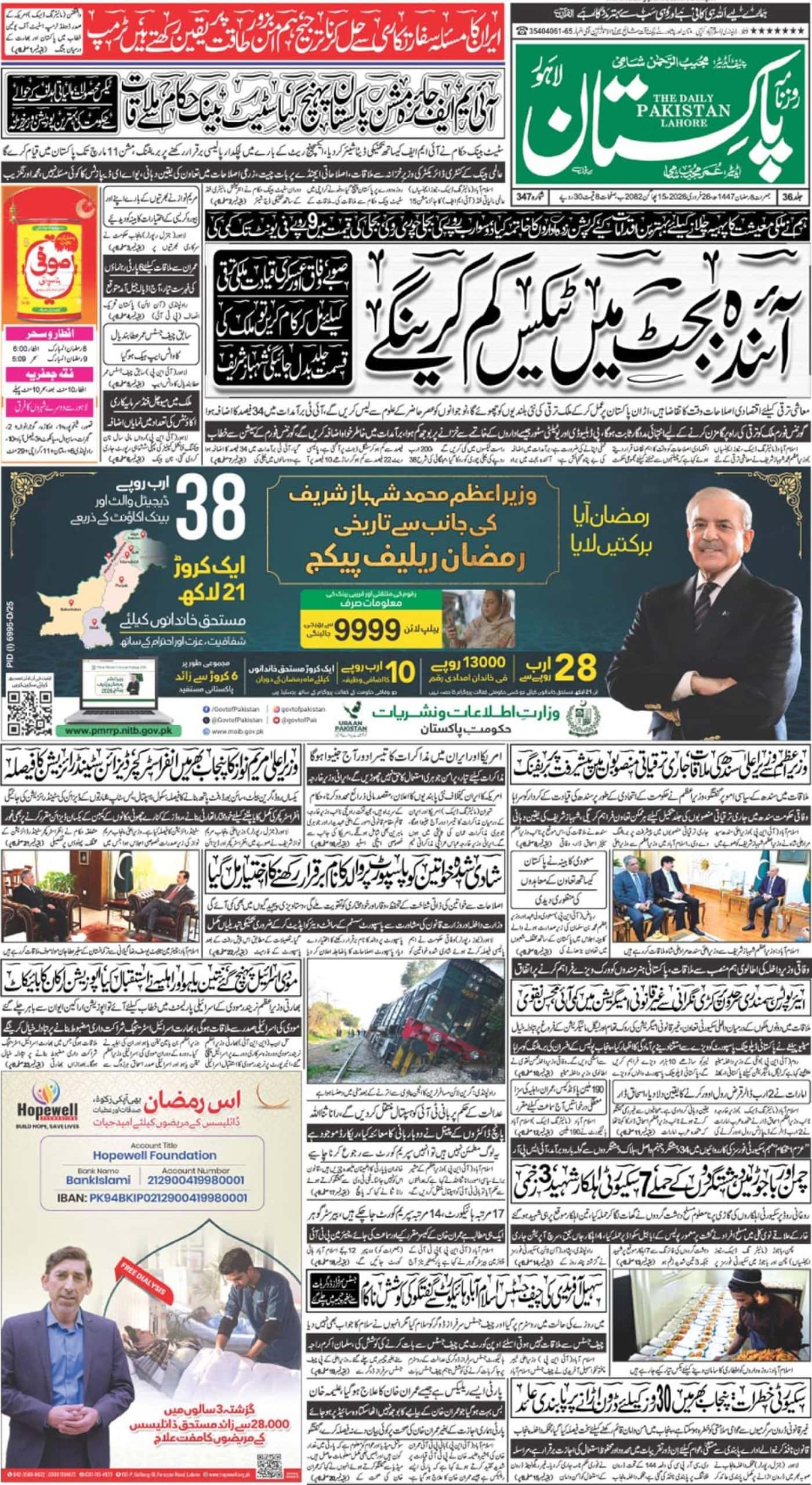ISLAMABAD – The Supreme Court on Thursday has provided assurances that the appointment of supervisory judge for NAB references will not affect the trial of the Sharif family in an accountability court.
A five member bench headed by Justice Asif Saeed Khosa and comprising Justice Ejaz Afzal, Justice Ijazul Ahsan, Justice Azmat Saeed and Justice Gulzar Ahmad stated this while hearing of the review petitions filed by Sharif family and Ishaq Dar against the Panamagate verdict.
Nawaz’s counsel Khawaja Haris completing his arguments before the court said that never was a judge appointed in the past to oversee a specific trial.
In reply, Justice Azmat Saeed said that the appointment of a supervisory judge is not a new phenomenon.
Haris replied that the judge is appointed for monitoring not for supervision.
Justice Khosa said that supervisor has been appointed to implement the court directions, adding that judge is deputed only for monitoring. He also provided assurances that the supervisory judge will not affect the NAB’s proceedings.
Article 203 explains the monitoring, Khosa said, adding the judge has nothing to do with the trial.
Restoring his arguments, Haris said that the election is declared null and void for not declaring assets, adding that the disqualification is applied for only one term when elections have no legal ground.
Nawaz was disqualified over concealing the assets and Aqama, the counsel said, adding that Article 62 (1) f of the Constitution is not used only for concealing assets as there is a proper law to deal with the non-declaration of assets.
The law defines a whole procedure to announce the disqualification of any member, he said, adding that the definition of bleak law dictionary was adopted to oust Nawaz.
There would be dire consequences of disqualification for life, the lawyer said.
He claimed that Nawaz had never considered the salary an asset; therefore, it had not been declared in nomination papers for general elections.
Haris claimed that his client had been declared dishonest due to a misunderstanding regarding considering the salary an asset.
Justice Ejaz Afzal questioned how it was possible to accept that Nawaz did not consider the salary an asset, adding that it is mentioned in job agreement with Capital FZE that former premier should get 10,000 dirham salary.
There is nothing in the agreement that Nawaz will not receive salary, Ejaz said, adding that law prefers written evidence over verbal.
Haris said that not declaring salary is dealt with under Section 76 (a) of the act, adding that 62 (1) is regarding honestly and not applicable to this case.
Justice Azmat Saeed reminded him that proceedings should be done under the act instead of announcing disqualification.
Justice Ejaz Afzal said that Nawaz did not declare the bank account for the FZE salary.
Haris replied that the Panama JIT had not said that the account was concealed.
Justice Ijazul Ahsan said that the bank account was opened through a set procedure and that Nawaz’s employee number is 194811.
The former prime minister had received salaries according to the documents of the JIT report, he said, adding that salary was transferred to Nawaz’s Capital FZE account in August 2013.
The evidences in this regard are attached in volume 9 of the JIT report.
Haris replied that the account is possessed by the company not Nawaz Sharif.
Justice Ejaz Afzal said that elections are declared null and void as the person who conceals assets has no right of membership.
The counsel said that no amount was transferred to account of Nawaz from FZE, adding that his client had declared all his bank accounts.
Haris said that reference cannot be filed on the basis of the JIT report as it is incomplete and there are flaws in the report.
In reply, Justice Ejaz said that it was possible to benefit from the discrepancies in the report, adding that he would get a proper chance for arguments in trial court.
The lawyer questioned how the court could order to file reference on incomplete report, adding that there will be no transparent trial.
Justice Ejaz replied that filing references did not affect the trial, adding, what we said is temporary and based on evidence.
In normal circumstances, the court ordered the SHO to challan an accused for not filing FIR, Justice Khosa said, adding, “I can refer three cases in which such directions were given”.
He added that a trial is necessary for disqualification as the trial provides chance to defend allegations and present evidence.
Haris said that court’s direction regarding references will affect the trial process.
Justice Ijaz said pointed out that this meant that the court should leave the matter of references to NAB chairman alone, adding that the background and conduct of the NAB chairman should be kept in mind.
Nawaz Sharif, Hussain Nawaz, Hassan Nawaz, Maryam Nawaz, Captain Safdar and Ishaq Dar had filed the petitions seeking review of the July 28 judgement and appointment of a supervisory judge for NAB references.
On July 28, the apex court had disqualified the former premier for not being honest and ordered his and his children’s trial at an accountability court.
Unanimous Decision for Disqualification
On Wednesday (Sept. 13), the five-member bench started hearing of the case in which Nawaz Sharif’s counsel Khawaja Haris submitted arguments before the court.
He contended that two members, who had disqualified the former PM on April 20 following the petitions filed by JI head Sirajul Haq, PTI chairman Imran Khan and AML chief Sheikh Rashid, could not be part of the implementing bench that disqualified Nawaz on July 28.
In response, Justice Ijazul Ahsan said that the April 20 judgement in which two judges declared Nawaz disqualified and three others voted for further investigation has not been challenged, adding, “It means you have accepted their verdict”.
Justice Azmat Saeed remarked that the five-member bench was to judge the disqualification case under the April 20 verdict.
Justice Asif Saeed Khosa said that the judges who declared Nawaz disqualified did not raise an objection on the July 28 verdict, adding that contention of every judge might be different but the decision to declare Nawaz disqualified was the same.
Haris said that the former premier was not given a fair trail in the case as neither show-cause notice was issued nor was he given a chance to clarify his position.
He also called the appointment of supervisory judge against the basic rights of the person who is being tried.
Panama Papers verdict
On April 20, Supreme Court’s Justice Asif Saeed Khosa had announced the Panama Leaks case decision comprising 540 pages, saying that the court issued a split ruling calling for a JIT. Two of the five judges went on to brand Sharif “dishonest” and saying he should be disqualified. However, the 3-2 split decision provided Sharif family a chance to prove their innocence and clear their names from Panama leaks.
Following the decision, the apex court formed a six-member inquiry team that included Federal Investigation Agency’s (FIA) Additional Director General Wajid Zia, Military Intelligence’s Brig Kamran Khurshid, National Accountability Bureau’s (NAB) Director Irfan Naeem Mangi, State Bank of Pakistan’s Amer Aziz, Securities and Exchange Commission of Pakistan’s (SECP) Executive Director Bilal Rasool and Inter-Services Intelligence’s Brig Muhammad Nauman Saeed.
The JIT members, during the seven-week period, interrogated eight members of the Sharif family including Nawaz Sharif, his younger brother Shehbaz Sharif, sons Hassan and Hussain Nawaz, daughter Maryam Nawaz, son-in-law Captain Safdar, cousin Tariq Fazal Chaudhry and brother-in-law Ishaq Dar and submitted its report on July 10.
On July 28, the five-judge larger bench of the Supreme Court headed by Justice Asif Saeed Khosa and comprising Justice Ejaz Afzal Khan, Justice Gulzar Ahmed, Justice Sheikh Azmat Saeed and Justice Ijaz-ul-Ahsan after a week-long hearings unanimously disqualified Nawaz Sharif.
“It is hereby declared that having failed to disclose his un-withdrawn receivables constituting assets from Capital FZE Jebel Ali, UAE in his nomination papers filed for the General Elections held in 2013 in terms of Section 12(2)(f) of the Representation of the People Act, 1976 (ROPA), and having furnished a false declaration under solemn affirmation respondent No. 1 Mian Muhammad Nawaz Sharif is not honest in terms of Section 99(f) of ROPA and Article 62(1)(f) of the Constitution of the Islamic Republic of Pakistan, 1973 and therefore he is disqualified to be a Member of the Majlis-e-Shoora (Parliament).”













